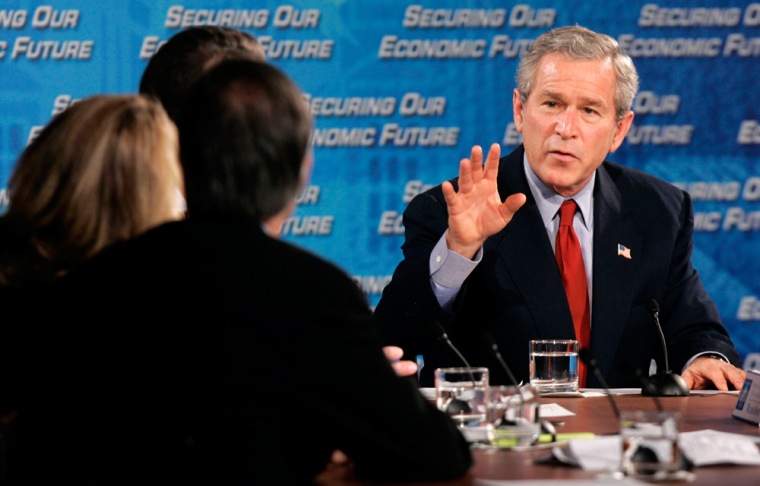President Bush Thursday outlined an ambitious second-term economic agenda topped by a plan to reform Social Security by giving workers the chance to invest some of their payroll taxes into personal accounts.
“Now is the time to confront Social Security,” Bush said before concluding a two-day White House economic conference that also focused on plans to reforming the federal tax code, making his major tax cuts permanent and cut the budget deficit in half.
Although Bush did not make any specific proposals, he reiterated his support for a program that would give workers the option to divert their payroll taxes into private accounts that would reduce their guaranteed government retirement benefits.
Democrats and a host of interest groups have mobilized to fight the plan and protect the traditional retirement system.
“The first issue is to explain to Congress and the American people the size of the problem,” Bush said at the White House meeting. “We will send a message not only to the American people that we’re here for the right reason, but we’ll send a message to the financial markets that we recognize we have an issue with both short-term deficits and the long-term deficits of unfunded liabilities to the entitlement programs.”
As the huge Baby Boom generation reaches retirement age beginning in about 2010, Social Security faces a shortfall projected at $3.7 trillion over the next 75 years.
But opponents of Bush's plan say Social Security could be repaired in its current form with only minor changes. The trustees of the system estimate its funding is adequate to pay full benefits until 2042. The Congressional Budget Office estimates the system will begin to run short in 2052.
“This is a manageable problem,” said Rep. Robert Matsui of California, the top Democrat on the House Ways and Means Social Security subcommittee. “He is trying to create a crisis.”
At his conference, Bush said his strategy will be “to grow the economy with reasonable tax policy but to make sure the deficit is dealt with by being wise about how we spend money.”
“It’s not going to be easy,” Bush said. “It turns out (congressional) appropriators take their title seriously.”
Bush said that dealing with Social Security would be a top priority.
No specifics, but some principles
Bush was not specific about his own ideas for solving the problem, but laid out a few do-or-die principles.
He said that for an undefined group of seniors “nothing will change” in their benefit structure, that there should be no increase in payroll taxes and that younger workers should be moved toward private accounts for some portion of their Social Security contributions.
The audience chuckled as Bush wrapped up his list of requirements by adding, “With those principles in mind, I’m open-minded with the members of Congress.”
Bush said there are more Americans who have no confidence they will ever see any Social Security benefits than people who are worried their current checks will stop coming.
“I think Congress needs to understand that,” he said.
Richard Parsons, chairman and CEO of Time Warner Inc., warned that “We’re on a train wreck course.”
“You can’t fix this problem with no pain, without making some sacrifices but the time to start making those sacrifices is now,” Parsons said. He said that by 2020 there will be two workers paying into the system for each person receiving benefits.
“There is a limit to how much you can tax, which means either benefits will have to come down” or the government will have to print more money to pay retirement costs, Parsons said.
The White House acknowledges that allowing younger workers to invest funds in private accounts would do little to help plug the Social Security shortfall.
“It will take more to solve the problem than just personal accounts,” White House spokesman Scott McClellan said Wednesday. The transformation would be part of a “comprehensive solution to strengthen Social Security.”
Just the 'first chapter'
Analysts said it was far too early to gauge Bush's chances of getting Social Security reform through Congress.
"I would call this the first chapter of a very long book," said Greg Valliere, chief strategist of Schwab Washington Research Group. "My sense is the main objective of the past two days has been to get in front of the people the idea that we have to do something."
Bush is expected to propose details in January, but won’t offer specific legislation. His summit helped bolster his plans by providing a public forum.
Bush has ruled out an increase in payroll taxes to pay for the overhaul. Experts say he would have little choice but to borrow the funds, perhaps $1 trillion to $2 trillion, in order to continue paying benefits for current and near-retirees whose checks are funded by workers’ payroll taxes.
